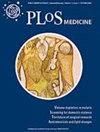Serum cobalamin in children with moderate acute malnutrition in Burkina Faso: Secondary analysis of a randomized trial
IF 9.9
1区 医学
Q1 MEDICINE, GENERAL & INTERNAL
引用次数: 3
Abstract
Background Among children with moderate acute malnutrition (MAM) the level of serum cobalamin (SC) and effect of food supplements are unknown. We aimed to assess prevalence and correlates of low SC in children with MAM, associations with hemoglobin and development, and effects of food supplements on SC. Methods and findings A randomized 2 × 2 × 3 factorial trial was conducted in Burkina Faso. Children aged 6 to 23 months with MAM received 500 kcal/d as lipid-based nutrient supplement (LNS) or corn–soy blend (CSB), containing dehulled soy (DS) or soy isolate (SI) and 0%, 20%, or 50% of total protein from milk for 3 months. Randomization resulted in baseline equivalence between intervention groups. Data on hemoglobin and development were available at baseline. SC was available at baseline and after 3 and 6 months. SC was available from 1,192 (74.1%) of 1,609 children at baseline. The mean (±SD) age was 12.6 (±5.0) months, and 54% were females. Low mid-upper arm circumference (MUAC; <125 mm) was found in 80.4% (958) of the children and low weight-for-length z-score (WLZ; <−2) in 70.6% (841). Stunting was seen in 38.2% (456). Only 5.9% were not breastfed. Median (IQR) SC was 188 (137; 259) pmol/L. Two-thirds had SC ≤222 pmol/L, which was associated with lower hemoglobin. After age and sex adjustments, very low SC (<112 pmol/L) was associated with 0.21 (95% CI: 0.01; 0.41, p = 0.04) and 0.24 (95% CI: 0.06; 0.42, p = 0.01) z-score lower fine and gross motor development, respectively. SC data were available from 1,330 (85.9%) of 1,548 children followed up after 3 months and 398 (26.5%) of the 1,503 children after 6 months. Based on tobit regression, accounting for left censored data, and adjustments for correlates of missing data, the mean (95% CI) increments in SC from baseline to the 3- and 6-month follow-up were 72 (65; 79, p < 0.001) and 26 (16; 37, p < 0.001) pmol/L, respectively. The changes were similar among the 310 children with SC data at all 3 time points. Yet, the increase was 39 (20; 57, p < 0.001) pmol/L larger in children given LNS compared to CSB if based on SI (interaction, p < 0.001). No effect of milk was found. Four children died, and no child developed an allergic reaction to supplements. The main limitation of this study was that only SC was available as a marker of status and was missing from a quarter of the children. Conclusions Low SC is prevalent among children with MAM and may contribute to impaired erythropoiesis and child development. The SC increase during supplementation was inadequate. The bioavailability and adequacy of cobalamin in food supplements should be reconsidered. Trial registration ISRCTN Registry ISRCTN42569496.布基纳法索中度急性营养不良儿童血清钴胺素:一项随机试验的二次分析
背景在中度急性营养不良(MAM)儿童中,血清钴胺素(SC)水平和食物补充剂的作用尚不清楚。我们旨在评估MAM儿童低SC的患病率和相关性,与血红蛋白和发育的关系,以及食品补充剂对SC的影响。方法和结果在布基纳法索进行了一项随机2×2×3析因试验。患有MAM的6至23个月大的儿童接受500 kcal/d的脂质营养补充剂(LNS)或玉米-大豆混合物(CSB),其中含有去皮大豆(DS)或大豆分离物(SI)和0%、20%或50%的牛奶总蛋白,为期3个月。随机化导致干预组之间的基线等效性。血红蛋白和发育的数据在基线时可用。SC在基线以及3个月和6个月后可用。在基线时,1609名儿童中有1192名(74.1%)可获得SC。平均(±SD)年龄为12.6(±5.0)个月,54%为女性。80.4%(958)的儿童中上臂围较低(MUAC;<125 mm),70.6%(841)的儿童体重-长度z评分较低(WLZ;<−2)。眩晕发生率为38.2%(456)。只有5.9%的人没有母乳喂养。中位(IQR)SC为188(137;259)pmol/L。三分之二的患者SC≤222pmol/L,这与血红蛋白降低有关。在年龄和性别调整后,非常低的SC(<112pmol/L)分别与0.21(95%CI:0.01;0.41,p=0.04)和0.24(95%CI:0.06;0.42,p=0.01)z评分较低的精细和大体运动发育相关。在1548名3个月后随访的儿童中,有1330名(85.9%)和1503名6个月后跟进的儿童中有398名(26.5%)获得了SC数据。基于tobit回归,考虑左删失数据,并调整缺失数据的相关性,从基线到3个月和6个月随访,SC的平均(95%CI)增量分别为72(65;79,p<0.001)和26(16;37,p<0.01)pmol/L。在所有3个时间点的310名SC数据儿童中,变化相似。然而,如果基于SI(相互作用,p<0.001),与CSB相比,给予LNS的儿童的增加量大39(20;57,p<001)pmol/L。没有发现牛奶的影响。四名儿童死亡,没有一名儿童对补充剂产生过敏反应。这项研究的主要局限性是,只有SC可以作为地位的标志,并且在四分之一的儿童中缺失。结论低SC在MAM儿童中普遍存在,可能导致红细胞生成和儿童发育受损。补充期间SC的增加是不充分的。应重新考虑食品补充剂中钴胺素的生物利用度和充分性。试验注册ISRCTN注册ISRCTN42569496。
本文章由计算机程序翻译,如有差异,请以英文原文为准。
求助全文
约1分钟内获得全文
求助全文
来源期刊

PLoS Medicine
医学-医学:内科
CiteScore
21.60
自引率
0.60%
发文量
227
审稿时长
3 months
期刊介绍:
PLOS Medicine aims to be a leading platform for research and analysis on the global health challenges faced by humanity. The journal covers a wide range of topics, including biomedicine, the environment, society, and politics, that affect the well-being of individuals worldwide. It particularly highlights studies that contribute to clinical practice, health policy, or our understanding of disease mechanisms, with the ultimate goal of improving health outcomes in diverse settings.
Unwavering in its commitment to ethical standards, PLOS Medicine ensures integrity in medical publishing. This includes actively managing and transparently disclosing any conflicts of interest during the reporting, peer review, and publication processes. The journal promotes transparency by providing visibility into the review and publication procedures. It also encourages data sharing and the reuse of published work. Author rights are upheld, allowing them to retain copyright. Furthermore, PLOS Medicine strongly supports Open Access publishing, making research articles freely available to all without restrictions, facilitating widespread dissemination of knowledge. The journal does not endorse drug or medical device advertising and refrains from exclusive sales of reprints to avoid conflicts of interest.
 求助内容:
求助内容: 应助结果提醒方式:
应助结果提醒方式:


